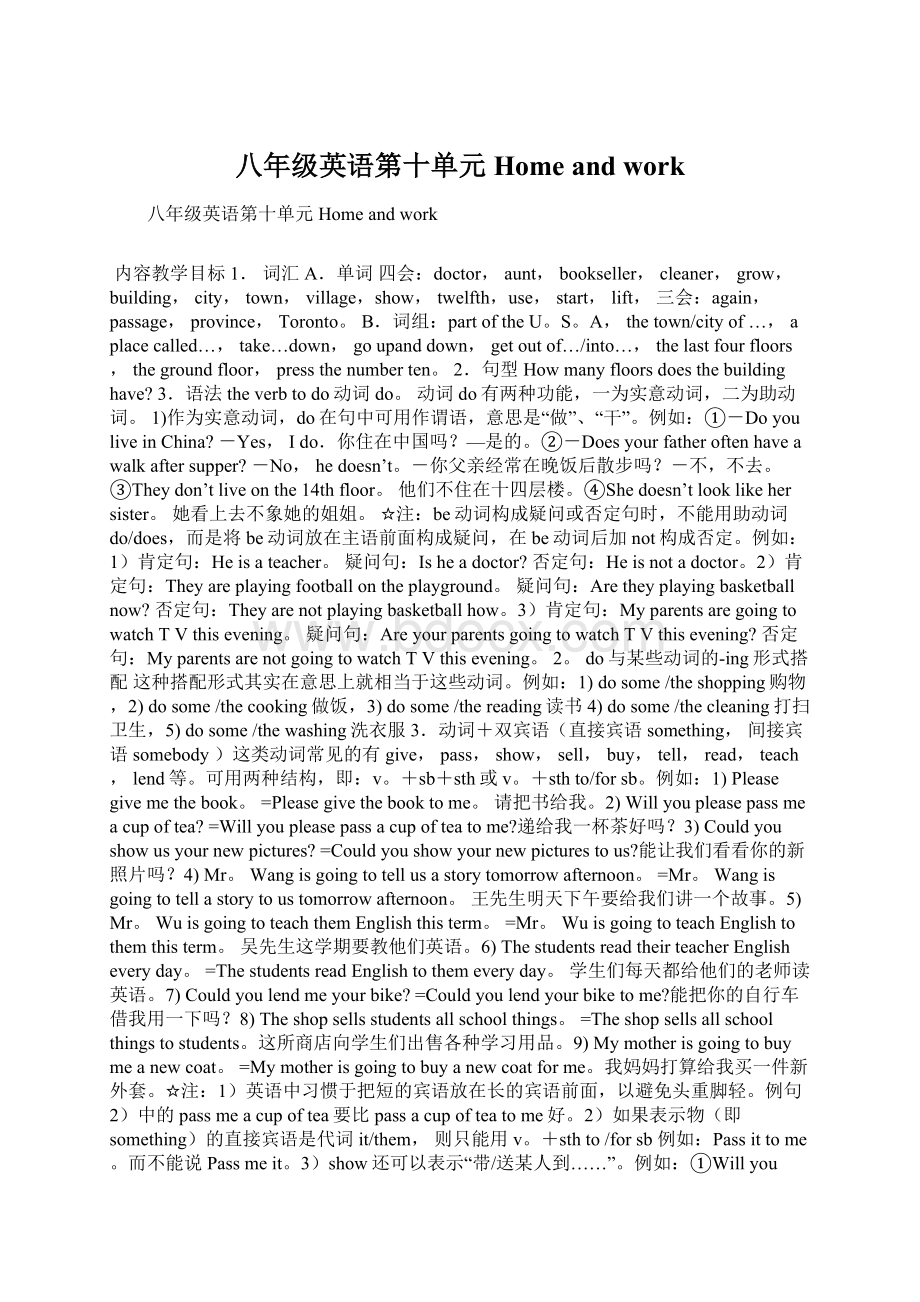八年级英语第十单元Home and work.docx
《八年级英语第十单元Home and work.docx》由会员分享,可在线阅读,更多相关《八年级英语第十单元Home and work.docx(4页珍藏版)》请在冰豆网上搜索。

八年级英语第十单元Homeandwork
八年级英语第十单元Homeandwork
内容教学目标1.词汇A.单词四会:
doctor,aunt,bookseller,cleaner,grow,building,city,town,village,show,twelfth,use,start,lift,三会:
again,passage,province,Toronto。
B.词组:
partoftheU。
S。
A,thetown/cityof…,aplacecalled…,take…down,goupanddown,getoutof…/into…,thelastfourfloors,thegroundfloor,pressthenumberten。
2.句型Howmanyfloorsdoesthebuildinghave?
3.语法theverbtodo动词do。
动词do有两种功能,一为实意动词,二为助动词。
1)作为实意动词,do在句中可用作谓语,意思是“做”、“干”。
例如:
①-DoyouliveinChina?
-Yes,Ido.你住在中国吗?
—是的。
②-Doesyourfatheroftenhaveawalkaftersupper?
-No,hedoesn’t。
-你父亲经常在晚饭后散步吗?
-不,不去。
③Theydon’tliveonthe14thfloor。
他们不住在十四层楼。
④Shedoesn’tlooklikehersister。
她看上去不象她的姐姐。
☆注:
be动词构成疑问或否定句时,不能用助动词do/does,而是将be动词放在主语前面构成疑问,在be动词后加not构成否定。
例如:
1)肯定句:
Heisateacher。
疑问句:
Isheadoctor?
否定句:
Heisnotadoctor。
2)肯定句:
Theyareplayingfootballontheplayground。
疑问句:
Aretheyplayingbasketballnow?
否定句:
Theyarenotplayingbasketballhow。
3)肯定句:
MyparentsaregoingtowatchTVthisevening。
疑问句:
AreyourparentsgoingtowatchTVthisevening?
否定句:
MyparentsarenotgoingtowatchTVthisevening。
2。
do与某些动词的-ing形式搭配这种搭配形式其实在意思上就相当于这些动词。
例如:
1)dosome/theshopping购物,2)dosome/thecooking做饭,3)dosome/thereading读书4)dosome/thecleaning打扫卫生,5)dosome/thewashing洗衣服3.动词+双宾语(直接宾语something,间接宾语somebody)这类动词常见的有give,pass,show,sell,buy,tell,read,teach,lend等。
可用两种结构,即:
v。
+sb+sth或v。
+sthto/forsb。
例如:
1)Pleasegivemethebook。
=Pleasegivethebooktome。
请把书给我。
2)Willyoupleasepassmeacupoftea?
=Willyoupleasepassacupofteatome?
递给我一杯茶好吗?
3)Couldyoushowusyournewpictures?
=Couldyoushowyournewpicturestous?
能让我们看看你的新照片吗?
4)Mr。
Wangisgoingtotellusastorytomorrowafternoon。
=Mr。
Wangisgoingtotellastorytoustomorrowafternoon。
王先生明天下午要给我们讲一个故事。
5)Mr。
WuisgoingtoteachthemEnglishthisterm。
=Mr。
WuisgoingtoteachEnglishtothemthisterm。
吴先生这学期要教他们英语。
6)ThestudentsreadtheirteacherEnglisheveryday。
=ThestudentsreadEnglishtothemeveryday。
学生们每天都给他们的老师读英语。
7)Couldyoulendmeyourbike?
=Couldyoulendyourbiketome?
能把你的自行车借我用一下吗?
8)Theshopsellsstudentsallschoolthings。
=Theshopsellsallschoolthingstostudents。
这所商店向学生们出售各种学习用品。
9)Mymotherisgoingtobuymeanewcoat。
=Mymotherisgoingtobuyanewcoatforme。
我妈妈打算给我买一件新外套。
☆注:
1)英语中习惯于把短的宾语放在长的宾语前面,以避免头重脚轻。
例句2)中的passmeacupoftea要比passacupofteatome好。
2)如果表示物(即something)的直接宾语是代词it/them,则只能用v。
+sthto/forsb例如:
Passittome。
而不能说Passmeit。
3)show还可以表示“带/送某人到……”。
例如:
①Willyoushowmetotheteachers’office?
你可以带我去教师办公室吗?
②Letmeshowyouintohishome。
我来带你进他的住所。
③Heisshowinghisfriendsaroundtheschool。
他正带着他的朋友参观学校。
4.grow的用法1)可用作及物动词,表示“种植”、“栽培”。
例如:
①Wegrowmanytreesandflowersonbothsidesofthestreet。
我们在街道两旁种植了许多树木和花草。
②Thefarmersgrowriceinthisfield。
农民们在这块田里种植水稻。
③Thegirlisgrowingherhair。
那个女孩儿正在留长发。
2)可用作不及物动词,表示“生长”、“增长”。
例如:
①Wehavegrownup。
我们已经长大了。
②Hehasgrownintoastrongboy。
他已经成长为一个健壮的小伙子。
③ThecityofBeijingisgrowingfast。
北京城正在飞速发展。
5.upanddown(…)表示“上上下下”,“来来回回”。
例如:
1)Acatisrunningupanddownthetree。
一只猫正在上上下下地爬树。
2)Alotofboatsarecoming/goingupanddowntheriver。
许多船只在这条河流里来来回回地航行着。
3)Theoldmaniswalkingupanddowntheroom。
那位老人在房间里来回踱着步。
4)Hegoesupanddownbylift。
他乘电梯上下。
☆注:
upanddown在句1)2)3)中是介词,在句4)中是副词。
6.英语和中文在表示地点和时间上的语序的不同。
中文是从大到小叙述,而英语则相反,是从小到大叙述。
例如:
1)Iliveinahouseinasmallvillageoutsidethecity。
我住在城外小村庄的一所房子里。
2)MysonPeterstudiesinClassFourGradeOneinNo。
14Middleschool。
我的儿子彼得在第十四中学一年级四班学习。
3)Theyaregoingtohaveaclassmeetingatthreetomorrowafternoon。
他们打算明天下干三点开班会。
4)IwatchTVonSaturdayeveningeverymeek。
我每星期六晚上看电视。
7.begin和start的用法这两个动词意思相同,都可表示“开始”,用法也大致一样。
例如:
1)Classesbegin/startathalfpastseven。
(我们)七点半钟开始上课。
2)Myfatherusuallybegins(starts)hiswork/begins(starts)towork/begins(starts)wordingateightinthemorning。
我父亲通常早上八点种开始工作。
3)Wearebeginning/startingtogooverourlessons。
我们正在开始复习功课。
4)Leavesbegin/starttoturnyellow。
树叶开始变黄了。
☆注:
1)begin和start即可作及物动词,也可做不及物动词。
如句1)句2)。
2)begin和start用于进行时的时候,后面只可接不定式,而不可接动词-ing形式。
如句3)。
3)当主语表示事物时,begin和start后面也接不定式,不接动词-ing形式。
如句4)。
8.finish的用法意思是“完成”,后面可接名词和动词的-ing形式。
即可作及物动词,也可做不及物动词。
例如:
1)Whenaretheygoingtofinishtheirhomework?
他们打算什么时候完成作业?
2)Iusuallyfinishreadingorwritingateightintheevening。
我通常看书或写作到晚上八点钟。
3)Thebuildingwillfinishintwoyears。
这座大楼两年后竣工。
☆注:
finish后不能接不定式。
9.否定疑问句和why引导的否定疑问句否定疑问句往往表示说话人的惊奇或怀疑,而why引导的否定疑问句则表示建议或疑问。
试比较:
1)Isn’tsheright?
难道她不对吗?
(说话人认为她是对的,表示怀疑。
)2)Don’tyouknowme?
难道你不认识我了吗?
(说话人认为对方应该认识自己,表示惊奇。
)3)Whydon’tyougoshoppingwithme?
=Whynotgoshoppingwithme?
你为何不跟我一起去购物呢?
(说话人在向对方提建议)4)Whydoesn’theansweryourcall?
他为什么不给你回电话呢?
(说话人想要知道原因,即答案,表示疑问。
)10.语音1)[s]字母s,c(在e,i,y前),字母组合ss,se均可发此音。
例如:
say,yes,class,pass,house,house,horse,face,office,city,certainly。
2)[z]字母z,s,字母组合se都发这个音。
例如:
zoo,busy,blouse。
3)[sp-],[st-],[sk-],[sm-],[sw-],以上为辅音连缀sp,st,sk,sm和sw的发音。
例如:
speak,study,skirt,smile,sweater。
同步练习1.找出下列各组单词中划线部分发音不同的单词()1)A.busyB.blouseC.noseD.house()2)A.carB.cityC.faceD.office()3)A.showB.windowC.growD.town()4)A.villageB.passageC.pastD.orange()5)A.drinkB.machineC.liftD.fish()6)A.greatB.readC.leaveD.clean()7)A.twelveB.elephantC.chickenD.question()8)A.cityB.whyC.sorryD.worry()9)A.photoB.hotC.postD.close()10)A.blueB.usuallyC.studentD.use2.根据要求改写下列句子1)Lucy’sbrotherworksinLondon。
(改为否定句)2)Theyliketoreadbooksverymuch。
(改为一般疑句)3)Thewomaninwhiteisadoctor。
(就划线部分提问)4)Weliveonthesixthfloor。
(同上)5)Myfatherusuallytakesawalkaftersupper。
(同上)3.选词填空,一词限用一次give,pass,buy,take,start,lend,show,mend,teach1)Heishungry。
Willyoupleasehimsomebreadinashop?
2)Itistoolate。
Thereisnobusnow。
You’dbetterataxi(出租车)。
3)Daddy,I’mgoingtowritealetter。
Couldyoumesomepaper,Please?
4)–Isthatyourbike?
--Yes,itis。
—Canyouittome?
--Certainly。
5)Thisisnotmyruler。
It’sKate’s。
Katetherulerplease,Lily。
6)Hismotherisashopkeeper。
Sheshoes。
7)Hedoesn’tknowthewaytoBeihaipark。
Letmehimtheway。
8)ThefirsttermofaschoolyearinSeptember。
9)MissGaodoesn’tusEnglishthisterm。
10)Thereissomethingwrongwithmywatch。
Canyouitforme?
4.选择填空1)—doeshisunclework?
-Onafarm。
A。
WhatB。
HowC。
WhereD。
When2)Jacknotlivingonthetopfloor。
A。
do…likesB。
do…likesC。
do…likesD。
does…like3)Howisthiselephant?
It’saboutninehundredKilos。
A。
tallB。
heavyC。
farD。
long4)WehaveEnglishlessonsFridayafternoon。
A。
inB。
atC。
onD。
for5)Hesometimesgoestoworkthebike。
A。
onB。
byC。
inD。
with6)TheyarelivinginaplaceRichmind。
A。
callsB。
calledC。
callD。
tocall7)—whatdoesMarydo?
-She。
A。
doessomereadingB。
ishelpinghermotherC。
isgoodatEnglishD。
worksinanoffice8)Myfatherworksinatownabout500Kilometreshere。
A。
awayB。
fromC。
farfromD。
nearto9)Howmanyfloorsthebuilding?
A。
does…haveB。
do…haveC。
does…hasD。
do…has10)Thisismyhawhouseletme。
A。
showyouinB。
showyouintoC。
showyouitD。
showittoyou11)–Doyouhaveapen,Jack?
-No。
Canyoubuy?
A。
itformeB。
onetomeC。
meitD。
oneforme12)Sheisaworker。
Shemakesinafactory。
A。
shoes…shoesB。
shoes…shoeC。
shoe…shoesD。
shoe…shoe13)WhorunsinyourClass?
A。
fastestB。
fasterC。
fastD。
mostfast14)Afteryouusethepen。
Pleaseintime(及时)。
A。
giveitbacktomeB。
givetomeitbackC。
giveittomebackD。
givemetoitback15)–Canyousomeoneoutsidethedoor?
-Yes。
Whoisit?
A。
hearB。
listenC。
hearaboutD。
listen5.阅读理解It’saSundaymorning。
LinTaohasnoschooltoday。
Hehasbreakfastandgoesout。
Heisgoingtohisgrandfather’shome。
Nowheisonhiswaythere。
Hewalksandwalks。
Thenhecomestoariver。
Theriverisnotwide(宽)。
Thereisabridge(桥)overtheriver。
LinTaowalksontothebridge。
Suddenlyhefallsintotheriver。
“Help!
Help!
”LinTaocries。
Butnoonecomes。
Thereisnoonenearby。
Hewaitsinthewaterforsometime。
Butnothinghappens。
Hebeginstogetup。
Aha,thewaterisnotverydeep。
Itonlycomestohalfhislegs(腿)。
1)LinTaogoestohisgrandfather’shome。
A。
ateightonaSundaymorningB。
ateightinthemorningC。
onaSundaymorningD。
inaSundaymorning2)Theriveris。
A。
verywidebutnotdeepB。
verydeepbutnotwideC。
verywideanddeepD。
notwideordeep3)LinTaofallsintotheriver。
A。
whenheiswalkingonthebridgeB。
whenhecomestoariverC。
whenhegetstohisgrandfather’shomeD。
whenhewalksalongtheriver4)comestohelphim。
A。
AmannearbyB。
nooneC。
HisgrandfatherD。
Hisfriend5)LinTaotheriveratlast。
A。
walksoutofB。
waitsinC。
walksintoD。
walkson6.完形填空Bessieisonlyfive。
Shedoesn’tgoto1andofcourseshe2howtoreadandwrite。
Buther3Maryisaschoolgirl。
Sheisten。
Oneday,Maryseesherlittlesisteratatablewitha45herhandandabigpieceof6infrontof7。
“Whatareyoudoing,Bessie?
”Sheasks。
“I’mwriting8tomyfriendkitty。
”“Buthowcanyou?
Sayshersister,“Youcan’twrite。
”“Well。
”saysBessie,“Itdoesn’tmatter,9kittydoesn’tknowhowto10。
()1.A.workB.cityC.farmD.school()2.A.knowB.doesn’tknowC.knowsD.don’tknow()3.A.sisterB.motherC.brotherD.friend()4.A.rulerB.bookC.penD.box()5.A.onB.withC.inD.outof()6.A.breadB.paperC.meatD.wood(木头)()7.A.herB.hersC.sheD.she’s()8.A.abookB.alessonC.aletterD.afilm()9.A.SoB.butC.andD.because()10。
A.readB.listenC.seeD.write答案1。
DADCBACBBA2。
1)Lncy’sbrotherdoesn’tworkinLondon。
2)Dotheyliketoreadverymuch?
3)Whatisthewomaninwhite?
/Whatdoesthewomaninwhitedo?
4)Whichfloordoyouliveon?
5)Whatdoesyourfatherusuallydoaftersupper?
3。
1)buy2)take3)pass4)lend5)Give6)sells